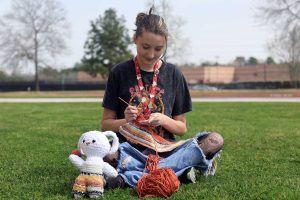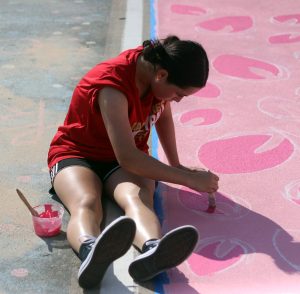Code of Ethics
CANEY CREEK STUDENT MEDIA CODE OF ETHICS
Adapted from the National Scholastic Press Association, Society of Professional Journalists, and Kirkwood Call codes of ethics.
All Caney Creek Student Media staff members believes the duty of journalists is to report truth.
We believe journalistic publications facilitate and guide the direction of public discourse while acting in their Constitutionally protected role to educate, inform, entertain and sometimes persuade the public on matters of current affairs.
We believe that a well-informed public is the lifeblood of a democratic society and the autonomy of individuals to make moral and efficient choices in their personal and professional lives, and in the voting booth.
We believe that those responsibilities come with a heavy burden, which include being responsible, fair, honest, accurate, independent and accountable (both of those in power and ourselves) all while minimizing harm.
As such, we accept this code of ethics as written below:
1. BE RESPONSIBLE
- Understand that student journalists are custodians, not owners, of their news medium, and they have an inherent obligation in decision-making to consider the heritage of their news medium, the values of the school community, the tenets of the school mission, the pedagogic concerns of school officials, and the wants and best interests of readers/listeners/ viewers.
- Keep yourself, the reporter, out of print. It’s not about you; it’s about the readers/listeners/viewers you serve. For the most part, student reporters and editors should not appear in the media they represent unless they are legitimate newsmakers. In those cases, the particular student journalists should have no influence on the coverage, and any conflict of interest should be disclosed.
- Staffers must declare conflicts and avoid involvement in stories dealing with members of their families. Staff members should not cover–in words, photographs or artwork–or make news judgments about family members or persons with whom they have a financial, adversarial or social relationship. Intra-staff dating is not recommended if one person assigns or evaluates the work of the other person or if one is in a position to promote the other to a higher staff position.
- Strive for substantive stories that produce insight, generate accountability and inspire reader interest and engagement. Do not yield to those who would suppress such insight or resist accountability.
- Remember that protections of the First Amendment were created to serve not the press but rather the people, and as a journalist guard the people’s interests above all others.
- Know the legal rights of student journalists and balance those rights with ethical responsibilities. Having the right to say something doesn’t make it right to say it. Balance the public’s need for information against potential harm or discomfort. Pursuit of the news is not a license for arrogance or undue intrusiveness.
- Recognize that legal access to information differs from an ethical justification to publish or broadcast.
- Defend relentlessly the First Amendment rights of students. Protect relentlessly media advisers from recriminations brought about by their advocacy of student rights.
- Demonstrate credibility and exemplify trustworthiness, reliability, dependability and integrity in and beyond journalism work. Your personal attributes affect the integrity of the news medium you work for.
- Be careful in covering stories about wrongdoing not to perpetuate misdeeds. Printing a photograph of malicious graffiti expands the vandal’s canvas.
- Do not allow vulgar or profane language to overshadow the essence of a story. If used, have compelling purpose and rationale to justify the audience’s need to read/hear vulgar or profane words. Consider alternatives to using profanity. The staff may decide to print or to limit the use of these words depending on their importance to the meaning of the story. For example, words may be partially obscured or bleeped. Do not use profanity in opinion articles, such as editorials, columns and letters to the editor.
- Staffers should avoid sexist labels and sexist descriptive language. Replace such language with neutral terms and descriptions.
- Identification of a person as a member of any population group should be limited to those cases when that membership is essential for the readerʼs complete understanding of the story; it should be done with great care so as not to perpetuate negative or positive group stereotyping. When identifiers are used, it is important that the correct one be used. Some examples of identifiers: Hispanic, Jew, lesbian, Italian, person with AIDS (PWA), a person with a disability, hearing impaired.
- Maintain a commendable work ethic—pursuing excellence, taking initiative, keeping to task, meeting deadlines and taking care of the workplace and equipment. Inspire fellow staff members to do the same.
- Cultivate respect for your adviser, fellow staffers, school officials and others. Nurture an effective working relationship within the staff. Keep emotions in check. Support team effort in gathering and reporting news. Be loyal in protecting the best interests of your news medium.
- Know when to show restraint in pursuing stories. For example, a spontaneous demonstration in the cafeteria by three students protesting the in-school suspension of a friend may receive notoriety, but its news value likely is insignificant. Furthermore, coverage of the incident may embolden others to disrupt the cafeteria too.
- Exemplify effective leadership through the power of performance rather than the power of position. Express genuine interest in every staff member. Be sensitive to other points of view. Inspire teamwork and intrinsic motivation. Prioritize mentoring over clout.
- Through all steps in the reporting process, from conceptualizing the story assignment, through information gathering and pre-writing, to writing, editing and final publication, a reporter must answer these questions:
- Why am I reporting the story?
- Is the story fair?
- Have I attempted to report all angles?
- Who will the story affect?
- Can I defend my decision to report the story?
2. BE FAIR
- Begin the search for truth with a neutral mind. Do not prejudge issues or events; wait until the facts and perspectives have been gathered and weighed. Discover truth without letting personal biases get in the way. Teach people to live by truth by presenting information objectively in a context that reveals relevance and significance. Take special care not to misrepresent or oversimplify in promoting, previewing or summarizing a story.
- Explore controversial issues dispassionately and impartially. Don’t go into a story with a personal agenda.
- Justify coverage decisions by showing newsworthiness of a story. Do not use your position with the paper to inflate your ego, favor friends, or advance other personal agendas that are self serving. If you profile an “athlete of the week,” be ready to show the criteria and objective process for selection. If you are a yearbook staffer, avoid a conflict of interest by working on spreads where you are not tempted to choose photos of yourself or of your friends for publication.
- Pursue a panoramic vision of issues and events to achieve balance and fairness. You may not know what the story really is until the story unfolds as you research it and talk with sources.
- Welcome diverse perspectives and particularly rebuttals to editorial positions. Support the open and civil exchange of views, even views they find repugnant.
- Seek out sources whose voices we seldom hear.
- Avoid stereotyping. Journalists should examine the ways their values and experiences may shape their reporting.
Refrain from “getting in the last word” by attaching an editor’s note to a letter to the editor. In rare circumstances, a clarification note may be justified. - Take initiative to give subjects of allegations an opportunity to respond in a timely manner. Make a serious effort to contact those subjects before going with a story in order to allow a response.
- Label or otherwise clearly identify editorials, opinion columns and personal or institutional perspectives, advocacy or commentary.
- Disclose any potential conflict of interest by a journalist or news medium. For example, conflicts of interests could involve personal relationships with news subjects or sources, associations with organizations, gifts and “perks” and vested interests in issues or events.
- Appreciate the fact that at any given time a reporter sees only a part of what can be seen. Don’t jump to conclusions.
- Gather, update and correct information throughout the life of a news story.
- If the subject of a story does not respond to a reporterʼs inquiry, the reporter may use the failure to respond in the story. However, use the verb “refused” to respond cautiously because of its connotation. It is better to use “declined to comment” or “would not respond.” If the subject cannot be reached, it is acceptable to say that the subject was not available for comment. The difference between not responding and not available for comment should be clear to the reader.
3. BE HONEST
- Do not plagiarize. Plagiarism is defined as the word-for-word duplication of another person’s writing or close summarization of the work of another source without giving the source credit. A comparable prohibition applies to the use of graphics. Information obtained from a published work must be independently verified before it can be reported as a new, original story. This policy also forbids lifting verbatim paragraphs from a wire service without attribution or pointing out that wire stories were used in compiling the story. Material that is published on the Internet should be treated in the same way as if it were published in more traditional broadcast media. Because plagiarism can significantly undermine the public trust of journalists and journalism, editors should be prepared to consider severe penalties for documented cases of plagiarism, including suspension or dismissal from the staff. Plagiarism is not only unethical, it is illegal if the material is copyright protected.
- Book, Song or Movie Titles are not copyright protected because they are by their nature not original.
- Cartoon characters are usually copyright protected and cannot be used–even if recreated by a staffer–without permission of the copyright holder.
- Currency may be reproduced as long as it lacks reproductive detail (use different sizes and colors).
- Games are copyright protected and may not be reproduced without permission of the copyright holder.
- Photographs of famous people are often copyright protected and may not be used without the permission of the copyright holder.
- Poetry lines may be used as long as the selection quoted does not constitute a substantial portion of the work and the work is credited. When quoting poetry, format the lines with the same alignment as the original, if possible.
- Song Lyrics are copyright protected; however, a staffer may quote up to four lines as long as the author receives credit.
- Stamps may be reproduced as long as they are not intended for use as counterfeits, or as long as they do not contain original artwork, i.e., a portrait of Elvis. When using stamps, reproduce them in larger or smaller sizes for publication.
- Do not fabricate any aspect journalism work without full disclosure. The use of composite characters or imaginary situations or characters will not be allowed in news or feature stories. A columnist may, occasionally, use such an approach in developing a piece, but it must be clear to the reader that the person or situation is fictional and that the column is commentary and not reporting. The growth of narrative story development (storytelling devices) means that reporters and editors should be especially careful to not mix fact and fiction, and not embellish fact with fictional details, regardless of their significance.
- Identify yourself as a reporter and do not misrepresent yourself while engaged in news media tasks. For example, a source deserves to know if he is engaged in casual conversation with a student or more guarded conversation with a reporter. For another example, don’t misrepresent yourself by pretending to conduct an official survey for the school when in fact you are conducting it for the student newspaper.
- Do not tolerate dishonesty of any staff member. One dishonest act of an individual can profoundly damage the reputation of a whole news organization. Be completely honest in reporting. Remember, half-truths can be just as egregious as outright lies.
- Stand by promises, including protecting the identity of confidential sources. Consider sources’ motives before promising anonymity. Verify information given by an anonymous source. Be cautious in making promises; consult editors; take time to consider ramifications of promises; don’t be pressured.
- Be guarded about the credibility of sources, and confirm questionable assertions. Do not be misled by insincere or unreliable sources. Try not to make reader guess whether a source is sincere. For example, an untruthful or embellished Q&A response can taint belief in the sincerity of other contributors as well.
- Be cautious of using satire. Because it involves irony and sarcasm, it is often misunderstood. Because it usually involves ridicule, it could be carried to an inappropriate level in a school setting. Because special April Fool’s Day editions can damage a paper’s integrity and credibility, and because they can pose a libel risk, they are strongly discouraged.
- Do not electronically alter the content of news and feature photos in any way that affects the truthfulness of the subject and context of the subject or scene. Technical enhancements, such as contrast and exposure adjustments, are allowed so long as they do not create a false impression. Photo content may be altered for creative purposes as a special effect for a feature story if the caption or credit line includes that fact and if an average reader would not mistake the photo for reality. Strive to record original action in photos.
- Set-ups or posed scenes may be used if the average reader will not be misled or if the caption or credit line tells readers that it is a photo illustration or a re-enactment or re-staging of an event, including award presentations. Recording the original action is always preferred.
- If using a recording device, get interviewee’s permission or make it obvious with the placement of the device that you intend to record. Know state laws regarding the legality of secretly recording private conversation.
- Do not be cavalier about truth. Truth breeds trust — an essential component of free and responsible media.
- Know “journalistic truth” must be accurate, should promote understanding and should be fair and balanced.
- Provide access to source material when it is relevant and appropriate.
4. BE ACCURATE
- Verify information before releasing it. Use original sources whenever possible.
- Remember that accuracy is often more than just a question of getting the facts right. Neither speed nor format excuses inaccuracy. Accuracy also requires putting the facts together in a context that is relevant and reveals the truth.
- Be a first-hand witness whenever you can. Gather raw facts. News releases, press conferences, official statements and the like are no substitute for firsthand accounts and original investigation.
- Review story to make sure information is presented completely and in proper context that will not mislead the news consumer, including visual information. Clearly label illustrations and re-enactments.
- Know your subject’s history to help measure his credibility as a source. If the subject has a reputation for embellishing information, make sure to verify information with another source.
- Be willing to read back quotes to check for accuracy. Sometimes a source may not be saying what he really means.
- Record accurate minutes of student media staff meetings that involve policy decisions and other actions that will have a lasting effect.
- Verify questionnaires answered by sources. Make sure no one posed as another person. Check comments for sincerity and accuracy.
- Tell not only what you know but also what you do not know. Invite a source or news consumer to fill you in on something he knows but you don’t.
- Engage in fact-checking every story. Train copyreaders to spot red flags and to verify questionable information.
- Be cautious about information received online. Not all sources are consistently credible, including sites such as Wikipedia, YouTube, blogs, and Facebook. Verify questionable information by consulting other sources.
5. BE INDEPENDENT
- Recognize inherent differences between the professional news media and the student news media, and understand that the latter will always be subject to some oversight by school administrators. Show administrators how it is in their best interests and the school community’s best interests to recognize student independence, within the parameters of law, in controlling the content of their news medium.
- Work to have your student news medium recognized as a public forum, which will provide greater independence in controlling editorial content.
- Resist prior review as a practice of administrative oversight in favor of less intrusive and more effective oversight strategies. Prior review dilutes student responsibility and puts more responsibility in the hands of administrators. Should the journalism experience teach responsibility or obedience?
- Hold no obligation to news sources and newsmakers. Journalists and news media should avoid even the appearance of conflict of interest.
- Accept no gifts, favors or things of value that could compromise journalistic independence, journalistic ethics or objectivity in the reporting task at hand. For example, a reporter covering a Spanish Club buffet event should not put his or her notepad and camera down to partake in the event. Nothing of value (over $10) should be accepted. Any gift of value should be returned to the sender or donated to charity.
- Be wary of sources offering information for favors or money; do not pay for access to news. Identify content provided by outside sources, whether paid or not.
- Declare any personal or unavoidable conflict of interest, perceived or certain, in covering stories or participating in editorial or policy decisions.
- Learn state laws regarding freedom of information, open meetings and shield laws. News media serve an essential function as a watchdog of government, and student journalists should not be asked to engage in any activity that is the responsibility of outside agencies, such as law enforcement, school administration and government. Cooperation or involvement in the work of these agencies should be restricted to what is required by law. Legal agencies, such as the Student Press Law Center in Virginia, may be contacted for advice.
- Avoid working for competing news media or for people, groups or organizations that the journalist covers.
- Show courage and perseverance in holding school officials and other decision-makers accountable when student control of student news media is threatened. Remember, students who produce non-public forum news media still have some rights regarding content decisions. Give voice to the voiceless.
- Give no favored news treatment to advertisers or special interest groups.
- Distinguish news from advertising and shun hybrids that blur the lines between the two. Prominently label sponsored content.
- Guard against participating in any school organizations or activities that would significantly create a conflict of interest.
- Journalists particularly should avoid holding office in student government, or they should be prepared to recuse themselves in either journalism or government forums when decision-making could pose a conflict of interest.
- Staffers may not cover a school or other organization they belong to, or participate in any editorial or business decisions regarding that organization. Staffers may provide story leads about the organizations to which they belong to other staffers. Staffers should report their memberships to their supervising editor.
- Political involvement, holding off-campus public office and service in community organizations should be considered carefully to avoid compromising professional integrity and that of the publication. The notion of the journalist as an independent observer and fact-finder is important to preserve. A staffer involved in specific political action, especially in a leadership role, should not be assigned to cover that involvement.
- Do not use a byline for editorials that represent the opinions of the news medium.
- Employment should not conflict with the stafferʼs first responsibilities to the publication. The staffer must report any employment to the editor to avoid any conflicts of interest with assignments or other staff editorial or business responsibilities or influence.
Approval of work for an off-campus news medium and free lance media work should be sought in advance of the commitment. It is permissible only in a noncompetitive medium, on a stafferʼs own time and should not conflict with the stafferʼs obligations to the publication.
6. MINIMIZE HARM
- Look beyond the likely impacts of each story, keeping alert to identify and respond to any unintended or undesirable consequences the story may hold in the shadows. Identify options for dealing with undesirable consequences. Determine if full disclosure of information may jeopardize student welfare unnecessarily; if so, decide what can be held back without jeopardizing the public’s right to know.
- Report immediately to school authorities any person who threatens the safety of himself or others.
- Avoid pandering to lurid curiosity, even if others do.
- Choose an option less offensive than self-censorship when it is prudent to do so. For example, the son of a secretary accused of embezzling from the student activity fund may be in distress when learning the student paper will cover the story. Tapping the school counselor rather than engaging in self-censorship is a better remedy to help the son deal with his fear of humiliation.
- Do not put student reporters in legal jeopardy or physical danger. Undercover stories may be unethical and may pose significant risks. Student journalists must obey the law. For example, a minor student who illegally purchases liquor to show readers/ listeners which stores violate the law also incriminates himself. Covering gang issues and other volatile topics require close faculty supervision and safeguards to protect student welfare.
- Be especially sensitive to the maturity and vulnerability of young people when gathering and reporting information. Take particular care to protect young sources from their own poor judgment when their comments can put themselves and others in jeopardy.
- Do not allow sources to use a news medium in malicious ways or ways that serve self-interest above the best interests of news consumers. Be on constant guard to spot clandestine efforts publish inappropriate messages.
- Show respect and compassion for students who may be affected detrimentally by news coverage. Use heightened sensitivity when dealing with juveniles, victims of sex crimes, and sources or subjects who are inexperienced or unable to give consent.
- Consider cultural differences in approach and treatment.
- Be sensitive when covering stories involving people in distress, and reject unreasonable intrusion by student media in their lives.
- Balance the public’s right to be informed with an individual’s right to be let alone.
- Understand and respect the different privacy expectations for private citizens, public figures and public officials when covering issues and events.
- Be cautious about identifying students accused of criminal acts or disciplinary infractions. Avoid naming minors. (Check local jurisdiction for legal definition of a minor.) If a student is legally an adult, be ready to show a compelling reason for identifying the name. Relevancy and news value can constitute a compelling reason. For example, if an 18-year-old student were suspended from school for attending the homecoming dance drunk, the name likely would not be used in a news story. However, if the student is the homecoming king, the news element of prominence may justify using the name. The names of some crime victims, especially victims of sex crimes, should be protected from disclosure when prudent. Do not implicate by association. For example, do not say “a school secretary was arrested and charged with ….” The reader could suspect any school secretary.
- Balance a suspect’s right to a fair trial with the public’s right to know. Consider the implications of identifying criminal suspects before they face legal charges. This is especially true for students charged with a crime, which could negatively impact their future, especially if they are found not guilty.
- Consider the long-term implications of the extended reach and permanence of publication. Provide updated and more complete information as appropriate. Consider that high-school students are still learning and maturing, and that interviews and accusations will follow them into adulthood, far after many of their views and behaviors have changed.
- The Caney Creek Student Media staff may choose to print general crime news obtained from official law enforcement agencies and public records in accordance with state law. The staff will not print information that is obtained only from oral comments from law enforcement personnel. With the exception of major crimes, predetermined by the editor, an arrested person is not named until charges are filed. The staff will not print the names of rape victims, and will take special precautions to protect the identity of other victims of crime (identify them by grade level only, if necessary).
- Educational records protected under FERPA, such as transcripts and disciplinary reports, are not public record and may not be published without consent of the individual student and, perhaps, a parent or guardian if the student is under the age of 18. Caney Creek Student Media staff will avoid publishing a studentʼs grade point average unless it is germane to the story and the individual has given consent.
- The names of students who use special education services are confidential and will not be published without consent of the student and a parent or guardian.
- Student journalists are permitted to take photos of public areas (hallways, lunch room or the street). Before taking a picture of a classroom, one must ask permission from the teacher. Photographers should not take pictures of special education classrooms because the identities of these students are confidential. One should also ask permission before photographing productions in the auditorium, such as school plays, because the use of flash may distract performers. (Ask to photograph the dress rehearsal instead.) Restrooms, locker rooms, closed meetings and private homes are not public areas and should not be photographed.
7. BE ACCOUNTABLE
- Abide by the same high standards they expect of others.
- Admit mistakes and publicize prompt corrections. Respond quickly to questions about accuracy, clarity and fairness. Explain corrections and clarifications carefully and clearly.
- Expose unethical practices of student journalists and student news media, and make remedies.
- Identify sources clearly. The public is entitled to as much information as possible to judge the reliability and motivations of sources.
- Use press passes for admission or special privileges, such as free tickets or entry, or special access, only in the capacity of a working journalist. In no event should use of such complimentary tickets or material influence the final articles appearing in any publication.
- Provide news media consumers with opportunities to evaluate student news media.
- Be friendly and sincere in welcoming criticism and weighing grievances from news consumers.
- Have dialogue with student media overseers, and be prepared to justify decisions, policies and actions.
- Keep notes and recordings of interviews for an indefinite time as evidence of responsible reporting.
- Hold school administrators and other student media overseers accountable for their actions and decisions just as they hold student journalists and student media accountable for their actions and decisions.
- Use the power of student media judiciously, and be prepared to provide rationale for any decisions or actions taken by news staffs.
- Use anonymous sources only if there is a compelling reason and only if the information given can be verified through another, known source. When sources are not given, people may question the credibility not only of the source but also of the news medium.
- Any materials given to the publication for review become the property of the publication and not of any individual staff member. The editor reserves the right to disperse the property in an equitable way.
- Reporters who use the Internet and e-mail to interview sources should identify themselves as a reporter immediately, and should verify the sourceʼs identity with a follow-up telephone call. The source should be told that the information given is for a story. Information from Internet chat rooms and bulletin boards should not be used except as background. Since some information on the Internet may not be accurate, verification of facts through another source is especially important.
- Editors and reporters should invite reader feedback and participation in the publication. Reaction by readers to what has been published should be invited through all methods of communication: paper, e-mail, phone, fax and in-person visits. The publication should hold periodic open forums or open houses for readers. Reader opinions and suggestions on a range of issues can be solicited at these forums and can form the basis for future reporting or commentary.







